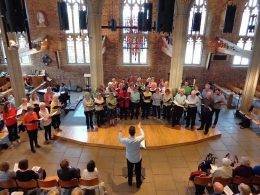Ella McDougall is Britain’s junior women’s single scull champion. Five years ago, she’d never touched an oar.
The 17-year-old from Putney won her second consecutive gold medal at the British Rowing Club Championships in September, beating rowers who train at some of the country’s most prestigious schools. She did it from Barn Elms Rowing Club, a council-owned boathouse on the Thames with 50 junior rowers and coaches who know every one of them by name.
She began rowing at twelve thanks to the encouragement of a friend’s mother, whose girlfriend was a GB rower. “I also did a summer camp, an intermediate one, before I joined the PJs [performance juniors], and that solidified for me that this was something I really wanted to do.”
Going from rowing once a week to six days, sometimes twice daily, McDougall has gone on to become the current junior women’s single scull champion – a title which means she has dominated others her age in a single-seater boat. Her most recent gold medal in the women’s J18 race was an achievement, she said, that was particularly satisfying.
“There’s not really any other word other than that I’m happy and proud of it. I think it’s an achievement that I wasn’t expecting this year.”

The Challenge
But Barn Elms doesn’t operate in isolation. Along this stretch of the Thames, Westminster School, Emmanuel, King’s College, and Dulwich College all have rowing programmes built into their curriculums with budgets to match.
A single-seater racing shell costs over £10,000. An eight-seater can exceed £40,000. While neighbouring private schools may field 100 racing juniors in a single year group, Barn Elms’ entire racing squad – ages 12 to 18 – numbers around 50.
Tim Park, head coach at Barn Elms, admits the club struggles with what he calls a ‘volume problem.’
“We are always trying to recruit more,” Park said.
Difficulties also arise when someone may fall ill before a race day. For eights – a racing boat powered by eight rowers and steered by a coxswain – he explained: “You require a group of people at a single consistent skill level, rather than four who may be very good and four who may be at the level below. So the struggle is having them race at the same skill level.”

What sets Barn Elms apart
Despite these constraints, McDougall is not the only champion to have come out of the rowing club. Former Barn Elms rower Helena Purves currently trains at Princeton after winning a gold medal in the GB8 at the World Rowing U19 Championships. Giulia Riley also became a national champion as a J16 and was selected last year for the England Rowing Team.
Five years down the line from when she first began, McDougall has continued to train at the club she started at, in part due to, she said, the coaches.
“At Barn Elms you’re not just a number on a board with an erg score [a performance metric on an indoor rowing machine]; the coaches care about the rowers on an individual level, and if they see some potential, they actually try to hone that.”
As opposed to some larger rowing clubs, where the number of juniors on a squad may mean it is easier to get ‘lost’ amongst the others, she believes that the smaller size of the boathouse has given the coaches the ability to implement more tailored training plans and one-to-one sessions.
Park’s holistic approach to running the racing squad – training the juniors to compete in a variety of boats, positions, and training programmes aligned to match their paces – has left them departing the club as ’rounded individuals as far as rowing is concerned’, he said.
“Hopefully at the club we’ll have taught you technique, we’ll have taught you how to race, and, god willing, we’ll have taught you how to win,” he added.
McDougall believes that although Barn Elms may have fewer ‘high-spectrum’ boats, it is the training and dedication of the team which has made the real difference.
“At the end of the day, the fancy boats don’t matter, what matters is that you are good at rowing,” she said.

Community impact
The boathouse is also making a difference through its community outreach programme, which aims to engage children from state schools who otherwise wouldn’t have had access to the sport. The club can accommodate 25 kids at a time through its junior courses, although programme manager Erin Herschel said there are already waiting lists of up to 20 children.
“The kids that come here do it for the love of the sport,” she said, “and the stories that come out of here are really incredible, from the racing squad to the community side.”
The club also offers discounted prices through an ‘access for all’ initiative and provides a select number of spaces that allow children to join for free, although this is something the club wishes to expand on in the future.
“That’s what we aim to do here,” Herschel said. “We want the kids to row at a high level, have fun, be safe but also make sure it’s accessible for everybody no matter their background.”
Looking ahead
As for the future, McDougall has set her sights on a university with a good rowing programme, where she hopes to study sport and exercise science, as well as making the GB squad cut-offs for under 23s.
When asked whether the time, dedication, and sacrifice were worth all her achievements, she was resolute: “Oh 100%. It’s been a lot of hard work but completely worth the dedication.”
It’s a dedication that Barn Elms has been fostering for nearly 70 years – proving that in rowing, as in life, resources matter less than commitment. Against private schools with ten times the budget and twice the boats, the small council-owned boathouse on the Thames keeps producing champions.
McDougall’s gold medal sits on her shelf at home. The next generation of rowers is already on the waiting list.










